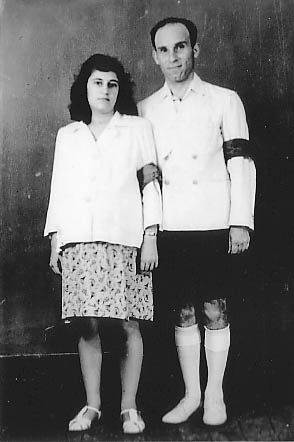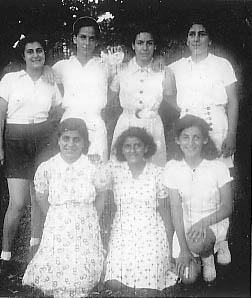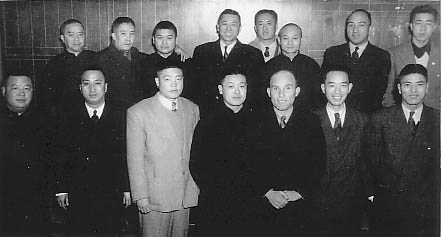History
My Experience
in Shanghai during W.W.II
By Cathy Hardoon
At last I am sending you my article and apologise
for not typing it. Although I have a computer, I need
to take lessons. The children are so proficient but
they have no time to come over and show me.
We were living in Shanghai, China during W.W.II in
relative peace, when suddenly, on December 8th, 1941,
the Japanese Army of Emperor Hirohito stealthily crept
in and occupied the city while everyone was asleep.
We woke up to find the usually quiet city swarming
with gendarmes on motorcycles, presenting themselves
to a shocked and unwary public.
Soon they issued edicts that we all had to adhere
to under the penalty of law. All news from outside
was censored. Short wave radios consequently, were
prohibited. This was the only link to the outside
world. We were only to hear what they wanted us to
hear. Soon all British, French and American nationals
were to sign up in preparation for internment at concentration
camps since these were direct enemies of Japan, though
non of them \had declared war on Japan. But the Japanese
had their special agenda of conquering the south pacific
and the Far East.
At any rate, the prospect of going to camp was extremely
distressing especially to the elderly who had lived
a very pampered life. Hitler's horrible deeds in Europe
were known to us at the time, the idea of concentration
camps was abhorrent to us. We later learned that the
Japanese were working with the Nazis. All foreign
businesses were closed and foreign currency was frozen
and banned.
People were given a few weeks in which they were allowed
from their accounts $500 a week for immediate expenses.
The British banks quickly transferred their deposits
and existing funds to England for safety and therefore
freeing the money from the hands of the Japanese but
at the same time leaving all their clients without
funds. These funds were never recovered by the owners
after the war. The situation was especially difficult
for those who were left to fend for themselves from
neutral countries and those, whose countries had only
severed relations with Japan.
The Iraqis like ourselves, were in this category.
The Japanese, following the German pattern, gave these
people pink armbands to wear with "Iraq"
written on them in Japanese. In this way they were
immediately identifiable wherever they went. In fact,
being of that nationality, we were issued these and
had to wear them on our left arms.
Whenever we passed by soldiers, we were made to feel
the butt of their jokes as they read our label aloud
"ah so- Iraquoo" it seemed this predicament
was extremely amusing for them. We were prohibited
from working so that in itself presented a problem.
My husband being of an enterprising nature devised
ways of making a living through this difficult period.
He was a broker and dealt in foreign stocks and shares,
which were now banned. He switched to Chinese shares,
which were permitted and collaborated with his Chinese
clients and friends who were pleased to keep working
with him.
The news of atrocities by the Japanese army in the
south pacific and the Philippine islands had preceded
them and when they arrived in Shanghai, they sent
shivers down our spines. However, luckily Shanghai
was declared an "open city" by the Geneva
Convention due to the fact that it was an international
city and occupied by many nationals. That being the
case, and still after much deliberation, the Japanese,
in their occupation, were forced to tone down their
excesses and activities. But to keep the populace
on edge and under strict surveillance, they wanted,
without prior notice barricade certain streets and
surrounded people from all four sides so that they
would be caught in the center unable to exit from
any direction. They would then be subjected to a thorough
search. If any contraband was found, the perpetrator
would be crushed, incarcerated and tortured- made
to suffer the consequences.
Now my husband had to wear his armband wherever he
went. But in order to be able to conduct his business
unobtrusively, he invariably removed it and placed
it in his pocket. In this way he continued doing business
with his colleagues. He used to carry gold bars in
his especially long stockings due to the fact that
these were banned and he was taking a great risk in
trading in them. Once he had an almost disastrous
encounter. He was at a small Chinese bank trying to
conclude a certain transaction. His armband was off
and the soldiers suddenly flooded the place without
prior warning as usual and proceeded to search all
who were present. He tried to think fast, quickly
sliding to the back and slipping on the armband. Then
he started praying. They finally got him and asked
him what he was doing there. He told them that he
just came to visit his friends. They hesitated a while
and since they found nothing on him, they let him
go with an admonition- not to congregate in banks.
He got out as fast as he could with a great sigh of
relief. There were several times when he occasionally
found himself in a barricaded street where he followed
the same procedure of slipping the armband off and
on which by the way became tattered and torn. He was
in instant danger and every day was a harrowing experience.
One day he had a very high fever with the flu and
insisted in delivering some gold bars, which he said
his client was waiting for. And if he didn’t
get it to him in the appointed time, the client might
well have a heart attack, as there was a large amount
of money involved. They worked by word of mouth and
nothing was written or documented. They all had a
deep trust in each other and a promise had to be kept
no matter what. As for myself I had to pray day to
day that someone up there would watch over him and
bring him home safely. He sat in a Rickshaw, his legs
covered by a blanket and arrived safely. It was an
extremely stressful time.
When the war was over, in August 1945, the Japanese
disappeared from Shanghai as quickly as they had came.
We suddenly saw the shining silver B-29's flying overhead
and that was the first indication that the war was
actually over- we were ecstatic- no more learning
the Japanese language which was forced on all of us-
as they had the grand illusion of conquering the world.
Best of all we were free and did not have to worry
about our safety any longer.
The interned folks returned home. Some died in the
camps due to malnutrition and ill care. Some returned
but did not live long afterward due to the extreme
conditions they had to endure. The younger folk and
the sturdy survived to start life over again in completely
different circumstances.
We now had to counter the Communist threat, so relief
was short lived. Mao-se Tung, their leader and his
party were steadily approaching the big cities and
provinces around the capitol of Nanking and Shanghai
the port. We did not wait for them. My husband decided
to wrap up our affairs and leave. By 1949, we were
out of Shanghai and on our way to the Philippines
and then to the USA. The rest of our community and
all other nationals cleared out by 1951 and 1952.
All properties and businesses in foreign hands were
systematically confiscated by the new regime and Shanghai
itself reverted to its original Chinese status according
to the old treaty between the British, French, American,
and the Chinese government as stipulated 100 years
before.
After 1952, it was difficult to find a foreign face
in the streets of Shanghai. It was a difficult concept
to imagine for that city so fair and unique. In its
time of splendour it had grown to become one of the
biggest ports in the world where trade and commerce
flourished and where men made their fortunes. Foreigners
had arrived there in the middle of the 1800s built
palaces, beautiful homes, hotels and large banks and
conducted big business. Shanghai was called the "Paris
of the East". Now all those who had worked, built
and lived there together with their descendants had
all returned to their respective homelands and left
Shanghai a forlorn city, an empty shell.
_________________________________________________________________________________
On arrival in the US and Private Bill in Congress
The communist were marching down and progressing
toward the big cities of China and we didn’t
want to be there when they arrived in Shanghai. We
were registered at the American consulate to immigrate
to the US. My brother Isaac left Shanghai with a Yeshiva,
as he had been studying with them for the Rabbinate.
After WW II, they all left for the US. Isaac advised
us repeatedly to come to the States. We had subsequently
applied to the US consulate to immigrate. We were
not aware that the quota for Iraqi subjects (100 a
year) was considerably over subscribed. So our file
lay dormant, as our number would have taken several
years to come up. Besides this, the American consulate
in Shanghai closed its doors and also we lost our
passports. The Iraqi government has recently announced
that all Iraqi persons who were away from their country
for more then 15 years had to return otherwise they'd
loose their citizenship. Our passports became void
and we couldn’t travel. Luckily, Charlie had
a brother in Paris and he asked him for help. His
brother Yamen assured him he'd take care of the problem
and not to worry. Yamen went to the Iraqi consulate
where he had a friend and armed with our old passports
and pictures, he mailed us new ones, which we received
by return mail.
We left Shanghai on March 24, 1949. We had to go
to the Philippines in order to get visas to the US.
We were not able to procure our visas immediately,
We had to use extreme patience. We lived in Manila
for two years. The reason was that we had previously
applied for immigration. We now had to apply for visitor's
visas. It was difficult but we finally got in touch
with a kind and generous Consul General who supplied
us with needed documents. We arrived in the States
as visitors. We came to Bayside immediately as Charlie's
cousin lived there and he wanted us to be near him.
So he and Charlie would conduct business together.
This move was fortunate because it placed us in a
position where we met some wonderful people who eventually
helped us in our quest for a permanent visa. Our temporary
visa kept expiring and we were supposed to leave the
country. It was a very rough time for us as we kept
having to go to Ellis Island for interrogation which
kept us in extreme pressure.
Our son Ellis wore a yamulka and because of that a
religious woman spotted him walking with Charlie and
not having seen him before asked him where he was
from and she finally came home to us and right away
made me a member of "Mizrachi Women" and
we became fast friends. We joined her groups which
was the young Israel where we became Chartred Members.
Now in this group there were several lawyers and one
of them happened to know a Congressman 'Latham' who
owed him a favour. Also a few people from the group
went around the neighbourhood canvassing for signatures.
They were able to collect 300 signatures on our behalf.
This, the lawyer gave to the Congressman and asked
him to sponsor a bill on our behalf so that we will
be able to remain in the US. The Congressman promised
to use his influence to introduce a private Bill saying
that the family of Salih Hardoon is hereby welcome
and favoured to stay, in the US as citizens. This
had to be signed by the President. It took several
sessions of Congress and of re-elections of Latham
until our bill came up. Finally, it passed congress
and then had to go to the Senate and finally signed
by the president in 1956. President Eisenhower signed
it and we became American citizens by Act of Congress.
Finally we were able to start a business which he
did with his cousin and a friend we met in Manila.
They saw an ad about a sale of Lingerie factory, which
they bought. This is how we started our business.
Eventually they parted and Charlie went on his own
and the business prospered. We manufactured ladies
lingerie and Charlie was busy with this work for 38
years until he retired. It wasn’t his most favourite
thing to do as he was never in a factory in his life.
But he picked it up as he went along. He actually
worked as a stockbroker and that’s his favourite
type of work. This was not possible for a new resident
in America. But we all got used to it and all the
family worked in the factory during the summer vacations
and they all did well.

June 1943: Charlie and Cathy Hardoon with Japanese
armbands |

Augsut 15 1940: Tennis Party, Shahmoon's Garden-
standing left to right: Cathy Levy, Renee Dangoor,
Rosie Jacob and Rosie Cohen.
Bottom, left to right: Katie Toeg, Sophie Cohen
and Joyce Dangoor |

Shanghai 1941: Charlie and his business associates.
Charlie- front row, 3rd from right
If you would like to make any comments or contribute
to The Scribe please contact us.